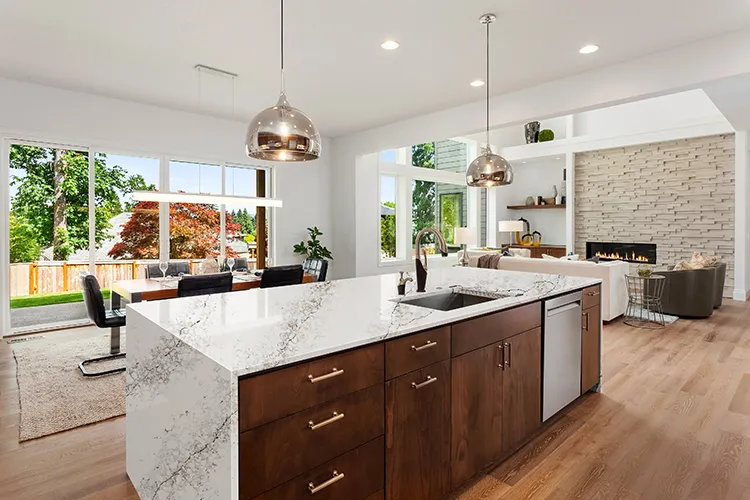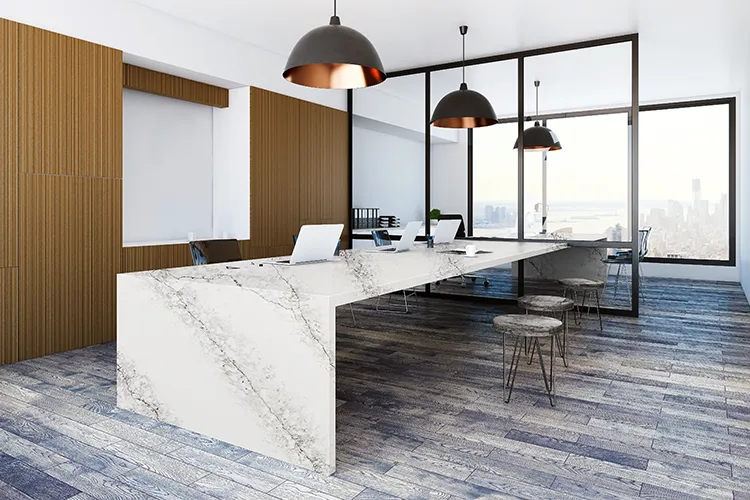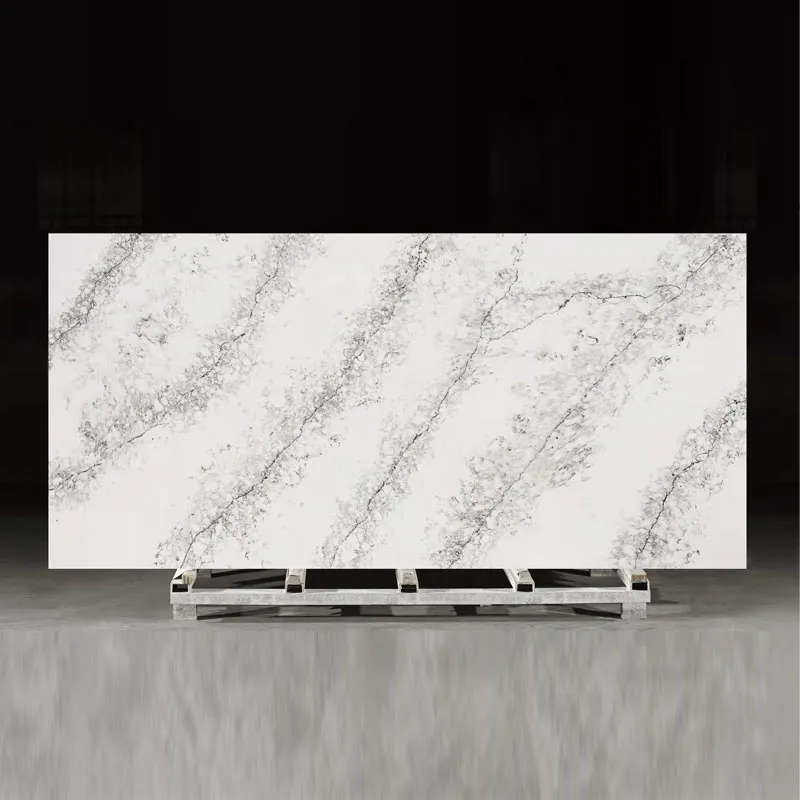Choosing the right countertop material is a crucial decision in kitchen and bathroom renovations. As two popular materials, quartz worktops and granite countertops each have their own advantages and both have impressive performance in terms of durability. However, consumers often face a key question: Which lasts longer, quartz countertops or granite countertops? To answer this question, it is necessary to conduct in-depth analysis from multiple angles such as material composition, physical properties, stain resistance, scratch resistance, heat resistance, maintenance requirements, etc.
This article will comprehensively compare the durability of quartz worktops and granite countertops to provide readers with a clear answer.

1. Differences in material composition and physical properties
Quartz worktops: a masterpiece of engineered stone
Quartz worktops are a synthetic material whose main component is about 90% to 95% natural quartz particles, supplemented by resin binders and pigments through high-pressure pressing. Since quartz itself is one of the hardest minerals on earth (Mohs hardness is 7), quartz countertops have extremely high hardness and durability. In addition, the addition of resin gives quartz countertops excellent toughness and impact resistance, making them less likely to crack or break.
This engineered stone has physical stability that is difficult for natural stone to achieve due to its uniform structure and artificial blending characteristics. Quartz countertops can easily withstand scratches, stains, and impacts from daily use.
Granite countertops: a classic representative of natural stone
Granite is a natural igneous rock, mainly composed of minerals such as feldspar, quartz and mica. As a natural stone, granite is deeply loved by consumers for its unique texture and color. Because it is naturally formed from a variety of minerals, the hardness and density of granite countertops are also very high, usually between 6 and 7 on the Mohs hardness scale.
However, the natural porous structure makes granite slightly inferior to quartz countertops in some aspects, especially in terms of stain resistance and protection, requiring more frequent maintenance and care.
2. Comparison of scratch resistance and wear resistance
Scratch resistance of quartz worktops
Quartz worktops are known for their high hardness and can withstand most scratches in daily kitchen operations. Whether it is the accidental contact of knives or the friction of other kitchen utensils, quartz worktops can maintain their smooth and scratch-free surface. This is due to the high hardness and tight molecular structure of quartz, especially the non-porous nature of quartz materials, which further enhances its wear resistance.
Therefore, from the perspective of scratch resistance, quartz countertops can still maintain their smooth surface after long-term use, even without excessive maintenance and treatment.
Scratch resistance of granite countertops
Granite countertops also have good scratch resistance. Because its hardness is close to quartz, it can effectively resist scratches in daily use. However, since granite is composed of multiple minerals, the hardness of its surface is not completely consistent. Sometimes, the minerals in certain areas are more fragile, resulting in local scratch problems.
In addition, the natural texture and porous nature of granite countertops may increase the visibility of scratches to a certain extent, especially when untreated. Therefore, although granite countertops have good scratch resistance, they are slightly inferior to quartz countertops, especially in long-term use.

3. Stain resistance and maintenance requirements
Stain resistance of quartz countertops
Because quartz worktops are engineered stones, they have an extremely dense non-porous surface, which means that they are not easy to absorb liquids or stains. Whether it is oil stains, coffee, red wine and other liquids spilled on the countertop, the quartz countertop can easily resist without leaving permanent marks. This stain resistance makes quartz countertops very easy to clean, and daily maintenance only requires a gentle wipe with a damp cloth.
In addition, since quartz worktops do not require regular sealing treatment, this also greatly reduces the cost and time of later maintenance, ensuring that it maintains a good appearance and performance in long-term use.
Stain resistance and maintenance requirements of granite countertops
Unlike quartz countertops, granite countertops are naturally porous materials, which makes it easier to absorb liquids and stains, especially when not sealed. Once liquid penetrates the granite surface, it may cause stains that are difficult to remove and even destroy the aesthetics of the countertop.
In order to prevent stains from penetrating, granite countertops usually need to be sealed regularly. Sealing maintenance once a year or every two years is a necessary step to maintain the stain resistance and durability of granite countertops. This undoubtedly increases the cost and time required for the later maintenance of granite countertops.

4. Heat resistance and chemical resistance
The heat resistance and chemical resistance of quartz countertops
Due to its resin composition, quartz countertops have good hardness and durability, but are slightly inferior to granite in terms of heat resistance. Quartz countertops can withstand a certain high temperature, such as short-term contact with hot pots or baking trays will not cause damage, but if the temperature is too high or long-term direct contact with high-temperature objects, it may cause surface discoloration or even damage.
In terms of chemical resistance, quartz worktops perform well. General kitchen cleaners or acidic substances (such as lemon juice and vinegar) will not cause damage to them, but strong acid or alkaline chemicals may still corrode quartz countertops, so special care needs to be taken when using these cleaners.
Heat resistance and chemical resistance of granite countertops
In contrast, granite countertops have excellent heat resistance. Because it is a natural igneous rock, granite experiences high temperatures during its formation, making it extremely resistant to hot objects in the kitchen. Placing hot pots or baking trays on granite countertops will not cause discoloration or damage, which gives granite countertops a significant advantage in heat resistance.
However, the porosity of granite makes it less resistant than quartz when faced with acidic or alkaline chemicals. Once these substances penetrate the surface of the stone, they may cause permanent damage to it. Therefore, strong acid or alkaline cleaners should be avoided when using granite countertops.
5. Antibacterial and hygienic properties
Antibacterial properties of quartz countertops
The non-porous structure of quartz countertops makes it not only excellent in stain resistance, but also has good antibacterial properties. As the kitchen is a high-risk area for bacterial growth, the antibacterial properties of the countertop are particularly important. Since liquids and food residues do not penetrate into the interior of the quartz countertop, it is difficult for bacteria to reproduce on the countertop, making quartz worktops a relatively safe and hygienic choice.
Antibacterial properties of granite countertops
Granite countertops also have certain antibacterial properties after sealing treatment, but due to their natural porous structure, liquids or food residues may penetrate into the countertops if they are not sealed or the sealing effect fails, thereby increasing the risk of bacterial growth. Therefore, granite countertops require more frequent cleaning and maintenance to ensure their performance in terms of hygienic performance.

6. Conclusion on durability after long-term use
By comparing quartz worktops and granite countertops in terms of hardness, scratch resistance, stain resistance, heat resistance, and antibacterial properties, the following conclusions can be drawn:
● Scratch resistance: Quartz countertops are slightly better than granite countertops, especially in the case of long-term use, quartz countertops can maintain a smooth and traceless surface.
● Stain resistance: Quartz countertops are not easy to absorb liquids or stains due to their non-porous structure, and they remain clean and beautiful for a long time, while granite countertops need to be sealed regularly.
● Heat resistance: Granite countertops are better than quartz countertops in heat resistance and can easily cope with direct contact with high-temperature objects.
● Antibacterial: The non-porous nature of quartz countertops gives them a greater advantage in antibacterial properties, especially in environments such as kitchens that require high hygiene.
Therefore, we can see that quartz countertops show superior durability in multiple dimensions, while granite countertops attract some consumers with their unique heat resistance and natural beauty. From an overall durability perspective, quartz countertops may be a better long-term choice, especially when less maintenance is required and aesthetics are maintained.
As one of the largest building material companies in South China, Rongguan delivers high-quality quartz worktops and terrazzo flooring to markets worldwide. Our factory combines state-of-the-art production lines with innovative design capabilities, offering tailored solutions to meet the diverse demands of architects, contractors, and wholesalers. Explore our extensive product range and enjoy factory-direct prices, exclusive promotions, and timely delivery for bulk orders.

